Explorez Fukui-Shi - Voyage au Japon, Asie
Fukui-Shi (ou Fukui) est la capitale de la préfecture de Fukui, située sur la côte ouest de l'île de Honshu au Japon. Bien que moins connue que d'autres villes japonaises, Fukui regorge de richesses culturelles, historiques et naturelles. Elle est facilement accessible depuis des grandes villes comme Tokyo, Osaka et Kyoto, ce qui en fait une destination idéale pour des visites courtes ou des séjours prolongés. La proximité de la ville avec la mer et les montagnes offre une variété d'activités et des paysages spectaculaires.
Population : Environ 264 000 habitants en 2017.
Économie : L'économie de Fukui est diversifiée entre les centres financiers, la fabrication, l'agriculture et la pêche commerciale, qui contribuent toutes à l'économie locale.
Sites remarquables : Renommée pour le temple Eiheiji, les ruines du château de Fukui et les falaises de Tojinbo.
Japan

Vue d’ensemble de Fukui-Shi
Histoire et influence culturelle
L’histoire de Fukui-Shi remonte à la période Asuka (538-710 après J.-C.) et elle a joué un rôle important tout au long de l’histoire du Japon. La ville était une place forte pendant la période Edo (1603-1868), servant de siège au puissant clan Matsudaira. Bien que le château de Fukui soit aujourd’hui en ruines, il reste un témoignage de l’importance historique de la ville. Fukui est également reconnue pour son art japonais traditionnel, son architecture et ses festivals qui font partie intégrante de son héritage culturel. L’influence du bouddhisme zen est particulièrement marquante, avec le temple Eiheiji comme centre spirituel. Cet héritage est préservé et célébré à travers les festivals locaux, l’artisanat traditionnel et la vie quotidienne à Fukui.
Interaction avec les habitants
Fukui compte environ 264 000 habitants. Les citoyens de Fukui sont connus pour leur chaleureuse hospitalité et leur fierté pour leur culture et leurs traditions locales. Ils accueillent volontiers les visiteurs, mettant un fort accent sur la préservation du patrimoine culturel tout en adoptant la modernité. Ce mélange de tradition et de vie contemporaine fait de Fukui une destination unique et accueillante pour les voyageurs en quête d’un lieu moins fréquenté au Japon.
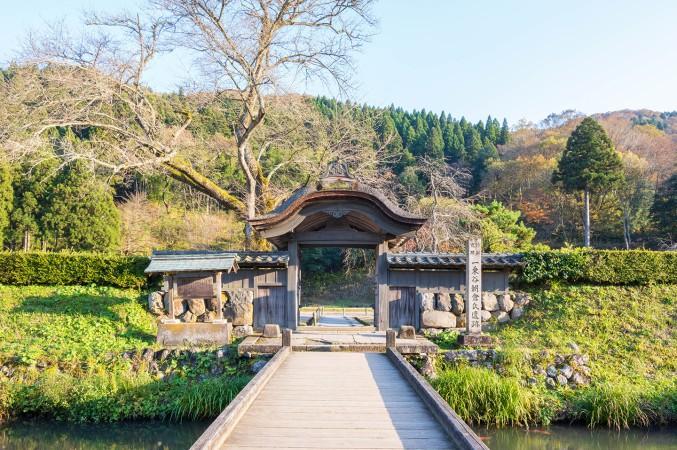
L'architecture ancienne de Fukui - © Japan Tourism
Principales attractions de Fukui-Shi
Temple Eiheiji
Fondé en 1244 par le maître zen Dogen, le temple Eiheiji est l’un des deux temples principaux de l’école Soto du bouddhisme zen. Niché dans les montagnes, ce complexe paisible offre aux visiteurs un environnement serein pour pratiquer la méditation zen ou simplement profiter de la tranquillité des lieux. Les magnifiques structures en bois, les chemins de pierre recouverts de mousse et les arbres centenaires créent une atmosphère d’une grande profondeur spirituelle, faisant de ce temple un site incontournable à Fukui.
Ruines du château de Fukui
Les ruines du château de Fukui témoignent de la riche histoire féodale de la ville. Autrefois un somptueux château appartenant au clan Matsudaira, il reste aujourd’hui des vestiges de sa grandeur passée, notamment des murs de pierre et des douves. Les visiteurs peuvent se promener autour du site, s’imaginant la splendeur de l’époque Edo tout en appréciant les jardins bien entretenus et les magnifiques cerisiers en fleurs au printemps.
Falaises de Tojinbo
Les falaises de Tojinbo sont une merveille naturelle qui offre des vues à couper le souffle sur le littoral accidenté le long de la mer du Japon. Ces falaises basaltiques spectaculaires, formées par une activité volcanique il y a des millions d’années, sont un lieu prisé pour la photographie et les balades en pleine nature. Les vagues s’écrasant contre les falaises créent un spectacle fascinant, particulièrement au coucher du soleil. Des excursions en bateau sont également disponibles pour ceux qui souhaitent admirer les falaises depuis la mer.
Musée des dinosaures de la préfecture de Fukui
Le musée des dinosaures de la préfecture de Fukui est l’un des principaux musées de dinosaures au monde et une visite incontournable pour les familles et les amateurs de dinosaures. Situé à Katsuyama, à une courte distance en voiture de la ville de Fukui, le musée abrite de vastes expositions comprenant des squelettes de dinosaures grandeur nature, des fossiles et des expositions interactives. C’est un voyage fascinant à travers les temps préhistoriques, offrant des expériences éducatives et divertissantes pour tous les âges.
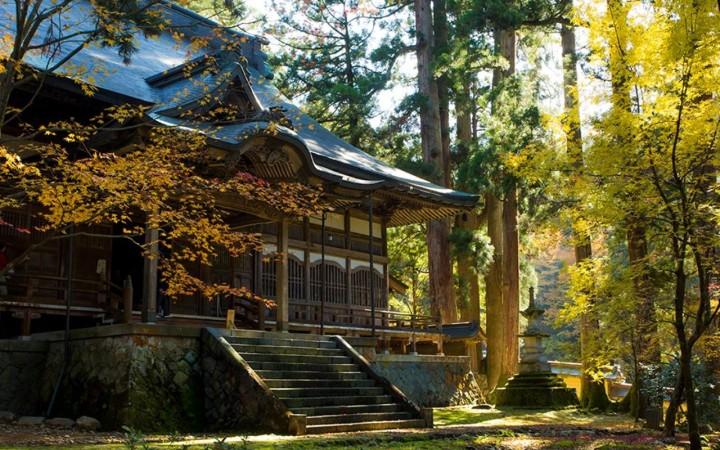
Temple Eiheiji - © Zen Buddhism
Plats incontournables à Fukui-Shi
Echizen Oroshi Soba
Ce plat apprécié se compose de nouilles de sarrasin froides garnies de radis daikon râpé, accompagnées d’une sauce savoureuse pour tremper. Sa saveur rafraîchissante en fait un excellent choix pour un repas léger et satisfaisant.
Fruits de mer de Wakasa Obama
Les fruits de mer de Wakasa Obama sont réputés pour leur fraîcheur et leur qualité. Profitez d’une variété de plats, du sashimi délicat au poisson grillé savoureux, mettant en valeur les riches ressources maritimes de Fukui.
Saké de Fukui
Réputé pour son exceptionnelle qualité, le saké de Fukui est élaboré avec de l’eau pure locale et du riz premium. Découvrez différentes variétés de saké dans les brasseries locales et savourez les saveurs uniques de cette boisson traditionnelle.
Sushi de Fukui
Fukui est également connu pour son sushi spécial, préparé avec du poisson frais provenant de la région. Les sushis ici sont souvent servis avec des garnitures innovantes et des sauces savoureuses, reflétant la créativité culinaire de la région.
Porc Kurobuta
Cette délicatesse locale, préparée avec du porc noir de qualité supérieure, est réputée pour sa saveur riche et sa tendreté. Le porc Kurobuta est généralement servi sous diverses formes, grillé ou en ragoût, et est un incontournable pour les amateurs de viande.
Heshiko
Plat traditionnel de poisson conservé, le Heshiko est préparé en fermentant du maquereau avec du son de riz. Sa saveur unique et acidulée en fait une addition intéressante à tout repas.
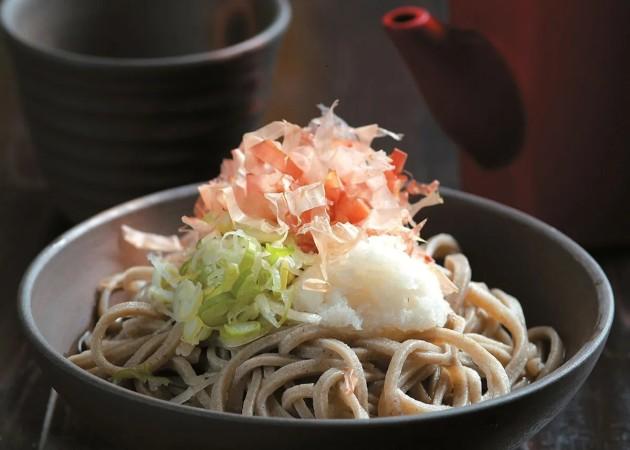
Echizen Oroshi Soba - © Eats.jp
Festivals et célébrations locales
Festival du Phénix de Fukui
Le Festival du Phénix de Fukui, qui se tient chaque mois d’août, est l’un des événements les plus vibrants et célébrés de la ville. Ce festival d’été propose une variété dynamique d’activités, notamment des parades animées avec des chars colorés, des performances de tambours traditionnels taiko et des danses énergiques. Le point culminant du festival est le spectaculaire feu d’artifice qui illumine le ciel nocturne, attirant des foules venues de partout.
Festival du papier Echizen
Célébré en octobre, le Festival du papier Echizen est un événement unique qui honore la longue tradition de fabrication de papier à Fukui. Le festival met en lumière l’art du papier Echizen, réputé pour sa qualité exceptionnelle et son importance historique. Assistez à des démonstrations en direct des techniques traditionnelles de fabrication du papier, participez à des ateliers pratiques ou explorez des expositions d’art sur papier.
Festival des cerisiers en fleurs de Fukui
Au printemps, le Festival des cerisiers en fleurs de Fukui transforme la ville en un paysage pittoresque de cerisiers en pleine floraison. Organisé dans divers parcs et le long des rivières, ce festival offre de magnifiques vues des arbres sakura en fleurs. Les visiteurs peuvent profiter de hanami (pique-niques sous les cerisiers), goûter des spécialités saisonnières aux stands de nourriture et participer à diverses activités en plein air.
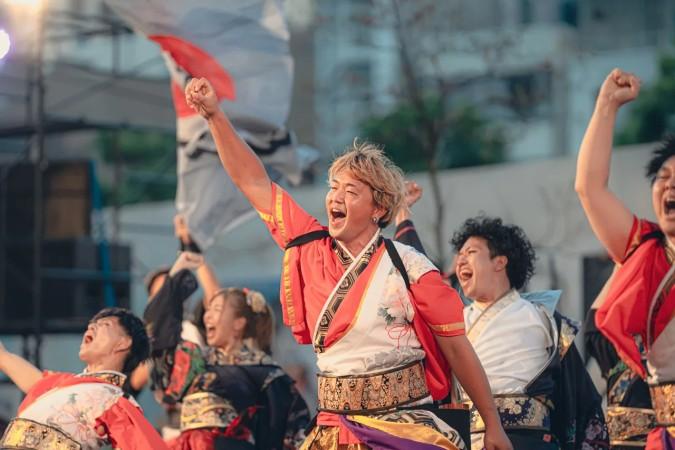
Festival du Phénix de Fukui - © Eiichi Yoshioka Photography
Que faire à Fukui-Shi
Activités de plein air à Fukui
- Sentiers de randonnée à Fukui : Les paysages naturels de Fukui offrent d’excellentes possibilités aux amateurs d’activités de plein air. La région propose de nombreux sentiers de randonnée qui serpentent à travers des forêts pittoresques, des montagnes et le long de la côte. Parmi les itinéraires populaires, on retrouve ceux de la région de Tsuruga City et les parcours panoramiques autour des falaises de Tojinbo.
- Exploration des plages et du littoral : Le littoral de Fukui offre de magnifiques endroits pour les amateurs de plage et d'activités côtières. Les eaux claires et les plages pittoresques sont idéales pour la baignade, les pique-niques ou simplement pour se détendre en profitant de la brise marine.
Expériences culturelles à Fukui
- Ateliers d’artisanat traditionnel : Fukui propose des expériences culturelles captivantes à travers des ateliers sur l’artisanat japonais traditionnel. Les visiteurs peuvent participer à des activités comme la poterie, la teinture à l’indigo et l’artisanat du papier traditionnel, tout en découvrant les traditions artistiques locales.
- Cérémonies du thé japonais : Vivez la sérénité d’une cérémonie traditionnelle du thé japonais à Fukui. Cette pratique ancestrale, reconnue pour son élégance et sa pleine conscience, permet aux visiteurs d’apprécier l’art de la préparation du thé et sa signification culturelle.
Shopping à Fukui-Shi
- Boutiques de poterie Echizen : Explorez les poteries traditionnelles d’Echizen dans divers magasins à Fukui. Renommées pour leur savoir-faire et leurs designs uniques, les poteries Echizen constituent des souvenirs et des cadeaux mémorables.
- Magasins d’artisanat en papier de Fukui : Visitez des boutiques spécialisées dans les produits en papier d’Echizen, notamment des articles de papeterie, des décorations et des œuvres d’art magnifiquement conçus. Ces magasins mettent en valeur le riche patrimoine de la fabrication du papier dans la région.
- Quartier commerçant de Katsuyama : Ce quartier offre un mélange de boutiques, de magasins locaux et de restaurants. C’est une zone prisée pour le shopping et la gastronomie, offrant un aperçu de Fukui à la fois moderne et traditionnel.
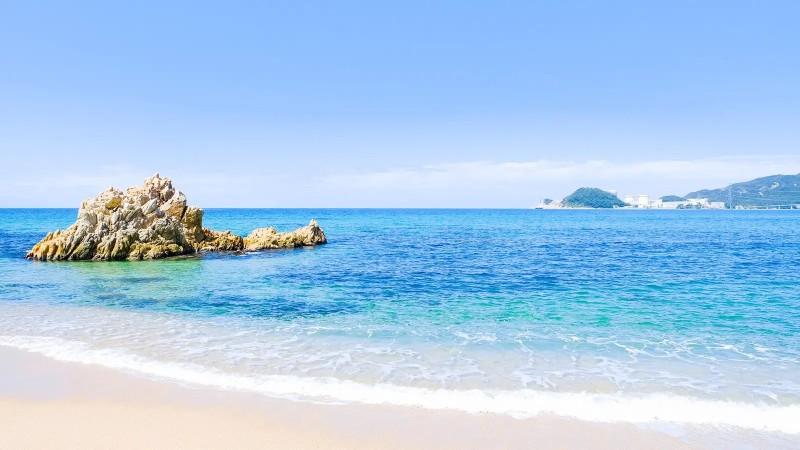
Se ressourcer sur une plage immaculée de Fukui - © Japan Tourism
Météo à Fukui-Shi : Meilleure période pour visiter
Printemps à Fukui-Shi
- Météo : Le printemps à Fukui offre des températures douces allant de 10°C à 20°C (50°F à 68°F) avec quelques averses occasionnelles. Les cerisiers en fleurs embellissent les paysages, offrant une vue splendide.
- Tendance touristique : Le printemps est une saison prisée pour le tourisme à Fukui, grâce à la floraison des cerisiers. Les visiteurs affluent dans les parcs et le long des rivières pour des pique-niques hanami (observation des fleurs), faisant de cette période un moment idéal pour les activités en plein air et la photographie. Le temps agréable favorise également les randonnées et la découverte des sites culturels de la ville.
Été à Fukui-Shi
- Météo : Les températures estivales à Fukui atteignent entre 25°C et 35°C (77°F à 95°F) avec une forte humidité et des précipitations accrues, notamment pendant la saison des pluies en juin et juillet.
- Tendance touristique : Malgré la chaleur, l’été est une période dynamique à Fukui grâce à ses nombreux festivals et événements en plein air, comme le Festival du Phénix de Fukui. Les touristes profitent de l’ambiance festive, des feux d’artifice et des spectacles traditionnels. Les activités côtières et les visites des marchés locaux sont également populaires en cette saison.
Automne à Fukui-Shi
- Météo : Les températures automnales varient entre 10°C et 20°C (50°F à 68°F), avec un air frais et des conditions généralement sèches. Les paysages se parent de teintes éclatantes grâce aux feuilles d’automne.
- Tendance touristique : L’automne est une saison privilégiée pour le tourisme à Fukui en raison des magnifiques couleurs automnales et du climat confortable. Les visiteurs profitent des conditions idéales pour la randonnée et les trajets pittoresques pour admirer le feuillage d’automne. Les événements saisonniers et festivals culturels, comme le Festival du papier Echizen, attirent également les touristes.
Hiver à Fukui-Shi
- Météo : Les températures hivernales varient de -5°C à 10°C (23°F à 50°F) avec un temps froid et des chutes de neige fréquentes, en particulier en janvier et février.
- Tendance touristique : Le tourisme hivernal à Fukui met l’accent sur les paysages enneigés et les événements de saison. Les illuminations et festivals d’hiver de la ville créent une ambiance festive et offrent un cadre magnifique pour la photographie. Les attractions intérieures et les sources chaudes sont également prisées des visiteurs cherchant chaleur et détente.
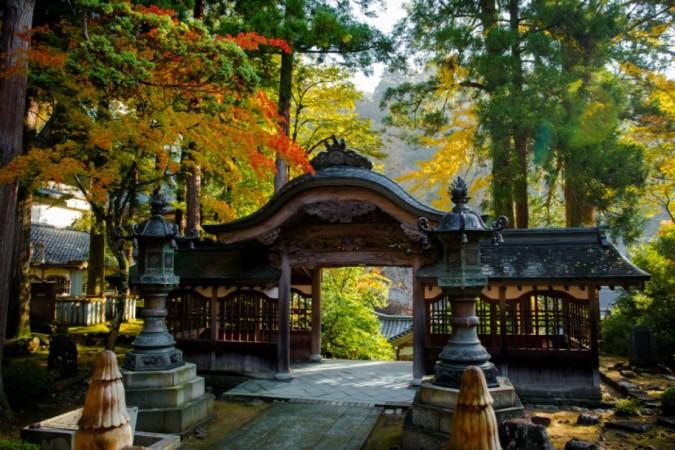
Temple Eiheiji en automne - © ZEKKEI Japan
Étiquette culturelle à Fukui-Shi
Coutumes dans les sento
Les bains traditionnels de Fukui, ou sento, suivent des coutumes spécifiques :
- Rinçage avant le bain : Avant d’entrer dans un bain collectif, il est d’usage de bien se laver et se rincer le corps aux stations désignées. Cette pratique garantit que l’eau du bain reste propre pour tous.
- Réflexion silencieuse : Les bains à Fukui sont destinés à la détente et à la réflexion. Il est important de minimiser le bruit et de respecter l’ambiance paisible du sento.
Participation aux festivals locaux
Lors des festivals et événements locaux, comme le Festival du Phénix de Fukui :
- Respecter les traditions : Participez avec respect et observez les coutumes locales. Par exemple, lors des parades ou cérémonies, suivez l’exemple des habitants et évitez les comportements perturbateurs.
- Tenue appropriée : Portez des vêtements confortables et adaptés, surtout si vous prévoyez de participer à des activités traditionnelles. Vous pouvez également porter un yukata (kimono d’été) si le festival en propose.
Informations essentielles pour voyager
Se déplacer à Fukui
- Trains et métros : La ville de Fukui est bien desservie par le train, avec la gare de Fukui comme principal hub. Les lignes JR West et Echizen Railway offrent un accès pratique aux différentes parties de la ville et aux régions voisines.
- Bus : Les bus locaux de Fukui proposent des itinéraires dans toute la ville et vers les attractions à proximité. Le système de bus est convivial, avec des horaires clairs et des plans de route disponibles.
- Taxis : Les taxis sont facilement accessibles à Fukui et peuvent être appelés dans la rue ou réservés à l’avance. Ils sont pratiques pour les trajets courts ou pour voyager avec des bagages.
- Location de voitures : Pour plus de flexibilité dans l’exploration de Fukui et de ses environs, louer une voiture est une option viable. Avoir une voiture permet un accès facile aux attractions éloignées et aux routes panoramiques.
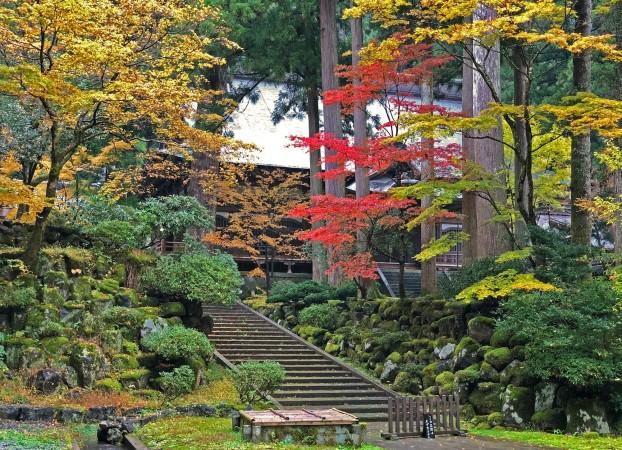
Capturez les magnifiques paysages de Fukui - © Tomas Gonzalez de Rosenzweig
Services bancaires et distributeurs automatiques (ATM)
Les distributeurs automatiques (ATMs) sont largement disponibles à Fukui, notamment dans les grandes banques, les supérettes et les centres commerciaux. De nombreux distributeurs permettent des retraits internationaux avec des cartes de crédit ou de débit étrangères. Comme tous les commerces n’acceptent pas les paiements par carte, il est utile d’avoir un peu d’argent liquide sur vous. Fukui dispose également d’un éventail d’institutions bancaires proposant des services standards tels que le change de devises et la gestion de comptes. Bon nombre de ces banques offrent une assistance en anglais, garantissant une expérience bancaire fluide pour les visiteurs internationaux.
Où séjourner à Fukui
Fukui propose une gamme variée d’hébergements pour répondre à différents besoins et budgets :
- Hôtels de luxe : Ces établissements offrent des équipements haut de gamme, une restauration raffinée et des installations de bien-être pour ceux qui recherchent une expérience premium.
- Hôtels de milieu de gamme : Pour une option plus économique, les hôtels de milieu de gamme proposent des chambres confortables et des équipements essentiels, alliant coût et qualité.
- Ryokan (auberges traditionnelles) : Pour une expérience japonaise authentique, séjourner dans un ryokan offre des chambres avec tatamis, des lits futons et des repas en plusieurs services, permettant une immersion culturelle unique.
- Maisons d’hôtes et auberges locales : Ces hébergements offrent une option personnelle et économique, avec une ambiance chaleureuse et des opportunités d’interagir avec des hôtes locaux.
Des articles pour vous
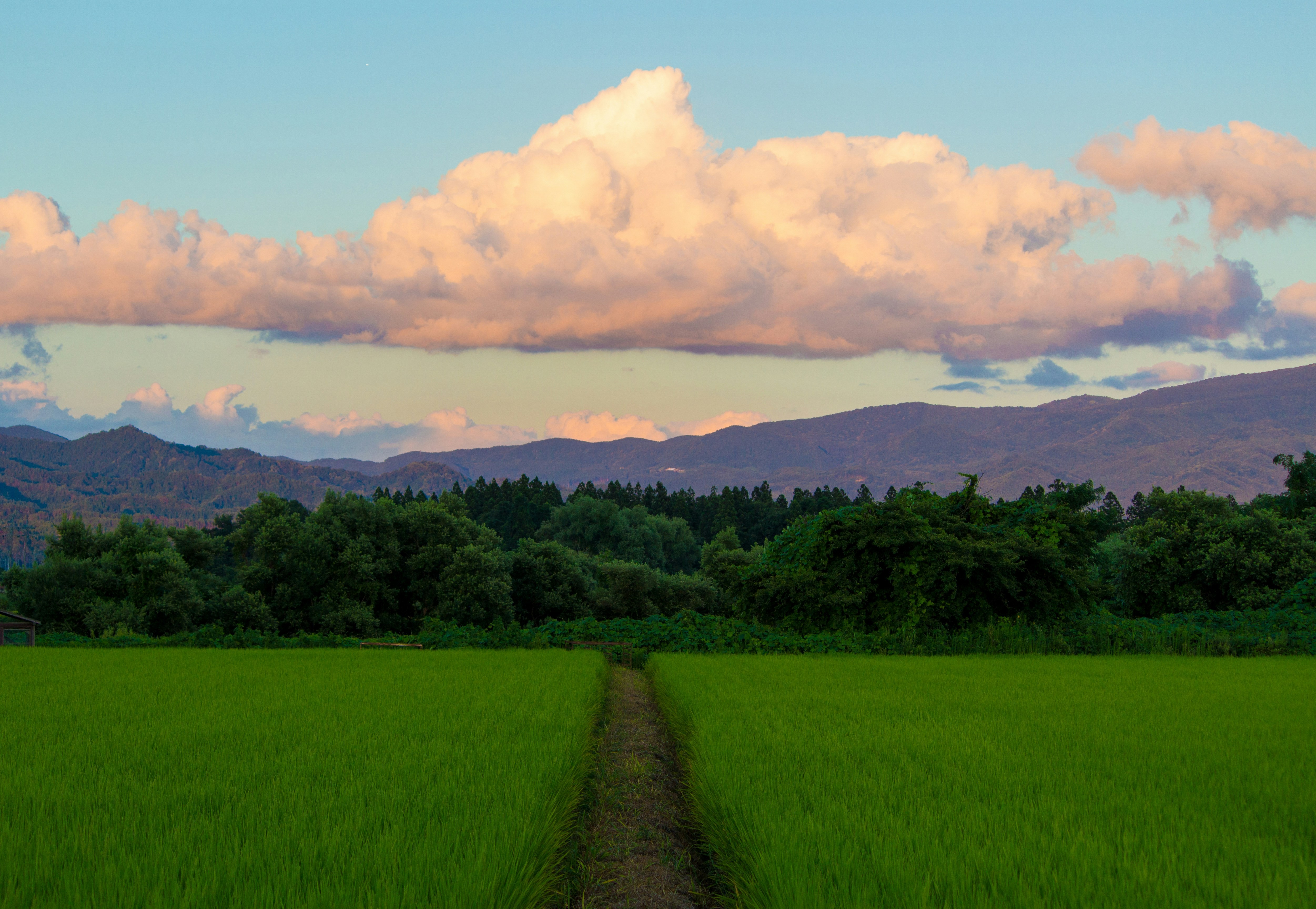
Explore Fukushima - Japan Travel, Asia
Nestled in Japan's scenic Tohoku region, Fukushima offers travelers a unique blend of historical charm, cultural richness, and natural beauty. Known for its stunning landscapes and welcoming communities, Fukushima is an excellent destination for those seeking an authentic Japanese experience beyond the bustling metropolises. Renowned for its diverse attractions, from ancient castles and hot springs to vibrant festivals and picturesque countryside, Fukushima offers a great opportunity for cultural and historical exploration for anyone who loves Japanese culture.
Population: Approximately 1.8 million in 2023.
Economy: Specializing in the seafood and fishing industries, Fukushima, with its historical impacts, now continues to thrive as one of the most developed and largest economies in Japan.
Landmarks: Famous for Aizu-Wakamatsu Castle, Fukushima City Historical Museum, and Ouchi-juku.

La symphonie saisonnière de l'Inde : Révéler les meilleurs moments pour explorer le sous-continent
Les traditions anciennes dansent avec les merveilles modernes dans une terre où les épices et l'encens embaument l'air, et chaque recoin cache une histoire prête à être découverte. L'Inde, vaste et diverse, se déploie comme un monde miniature en soi. Mais quand devriez-vous entreprendre ce voyage épique ? Rejoignez-nous pour un tourbillon à travers la tapisserie saisonnière de l'Inde et trouvez le moment parfait pour votre aventure.

Voyage culinaire à travers la Chine : Savourez les saveurs diversifiées
Des rives subtropicales de Canton aux steppes balayées par le vent du Xinjiang, le vaste paysage de la Chine est une tapisserie de saveurs, chaque région mettant en avant ses propres trésors culinaires. Avec plus de 2000 miles séparant les palais de dim sum du sud des étals de kebabs du nord-ouest, et des woks crépitants entre les deux, la diversité gastronomique de la Chine est véritablement inégalée. Alors, prenez vos baguettes et embarquez pour une aventure gourmande à travers les plats les plus délicieux du Royaume du Milieu !

Vivez l'expérience à bord du RV Indochine II - Une croisière sur le Mékong
Le RV Indochine II est un navire de croisière fluviale de luxe, offrant un voyage inoubliable à travers de nombreuses attractions le long du fleuve Mékong. Construit en 2017, ce vaisseau haut de gamme allie élégance coloniale et commodités modernes pour créer un environnement à la fois confortable et élégant pour son équipage et ses passagers. La taille intime du navire en fait le choix idéal pour ceux qui recherchent une expérience de croisière plus personnelle tout en explorant la culture, les paysages et le patrimoine riches du Vietnam et du Cambodge. Que vous admiriez le paysage depuis votre balcon privé ou que vous dégustiez une cuisine locale authentique, le RV Indochine II promet une aventure exotique hors du commun.

Assistez à la pêche sur pilotis au Sri Lanka
Le Sri Lanka, réputé pour ses plages magnifiques et son riche patrimoine culturel, abrite une tradition unique qui captive les voyageurs depuis des siècles : la pêche sur pilotis. Cette pratique ancienne, transmise de génération en génération au sein des communautés côtières, allie art et nécessité, offrant un aperçu d'un mode de vie intimement lié aux rythmes côtiers de l'île. La pêche sur pilotis au Sri Lanka n'est pas simplement un moyen de capturer des poissons ; c'est un emblème culturel, incarnant la résilience et l'ingéniosité des communautés de pêcheurs sri-lankaises.

À l'assaut des sommets : guide du randonneur de l'Himalaya
Lorsque les premiers rayons du soleil teintent les sommets enneigés de doré et de rose, vous êtes au seuil de l'aventure. Bienvenue dans l'Himalaya, où chaque pas est une immersion dans le plus grand spectacle de la nature. Avec Tweet World Travel comme guide, préparez-vous à un trek d’aventures, qui éveillera vos sens et vous transformera à jamais.
